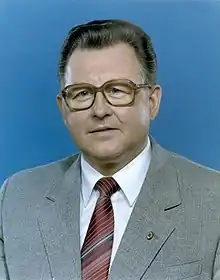Hans-Joachim Böhme | |||||||||||||
|---|---|---|---|---|---|---|---|---|---|---|---|---|---|
 Böhme in 1986 | |||||||||||||
| First Secretary of the Socialist Unity Party in Bezirk Halle | |||||||||||||
| In office May 1981 – 9 November 1989 | |||||||||||||
| Second Secretary |
| ||||||||||||
| Preceded by | Werner Felfe | ||||||||||||
| Succeeded by | Roland Claus | ||||||||||||
| Second Secretary of the Socialist Unity Party in Bezirk Halle | |||||||||||||
| In office 1974–1981 | |||||||||||||
| First Secretary | |||||||||||||
| Preceded by | Dieter Itzerott | ||||||||||||
| Succeeded by | Walter Kitzing | ||||||||||||
| |||||||||||||
| Personal details | |||||||||||||
| Born | Hans-Joachim Böhme 29 December 1929 Bernburg (Saale), Free State of Anhalt, Weimar Republic (now Saxony-Anhalt, Germany) | ||||||||||||
| Died | 4 September 2012 (aged 82) Halle (Saale), Saxony-Anhalt, Germany | ||||||||||||
| Political party | SED-PDS (1989–1990) | ||||||||||||
| Other political affiliations | Socialist Unity Party (1946–1989) Social Democratic Party (1945–1946) | ||||||||||||
| Alma mater | |||||||||||||
| Occupation |
| ||||||||||||
| Awards |
| ||||||||||||
Central institution membership
Other offices held
| |||||||||||||
Hans-Joachim Böhme (29 December 1929 – 4 September 2012) was a German politician and high-ranking party functionary of the Socialist Unity Party (SED).
In the German Democratic Republic, he served as the longtime First Secretary of the SED in Bezirk Halle and was a member of the Politburo of the Central Committee of the SED.
Life and career
Early career
Until 1955, Böhme served as an SED party staff member initially at the district level (Bernburg), later in Bezirk Halle. From 1955 to 1958, he obtained a diploma in Social Sciences at the "Karl Marx" Party Academy. Afterward, he served as the First Secretary of the SED in Weißenfels until 1963.[1][2]
Bezirk Halle SED career
From 1968 to 1974, he was the Secretary for Agitation and Propaganda and from 1974 the Second Secretary of the SED in Bezirk Halle.[1]
In 1967, he obtained his doctorate from the University of Halle with a thesis on Political Consciousness Formation in Socialism – Issues of political consciousness formation in the period of comprehensive socialism development in the GDR and its management by the Marxist–Leninist party, illustrated by the activities of the SED leadership in Bezirk Halle.[3]

In May 1981, Böhme rose to the position of the First Secretary of the SED in Bezirk Halle,[1][2] incumbent Werner Felfe joining the Central Committee Secretariat as Secretary responsible for Agriculture.[4]
From 1981 to 1989, Böhme was a member of the Central Committee of the SED and a member of the Volkskammer. From 21 April 1986 (XI. Party Congress) until his resignation in November 1989, he was a full member of the Politburo of the Central Committee of the SED,[1][2] the de facto highest leadership body in East Germany, Bezirk Halle being an important centre for the chemical industry.[3]
Böhme's tenure was viewed negatively. His leadership style was authoritarian, occasionally described as absolutist,[2][3] and he was viewed as a hardliner.[2] Unlike other First Secretaries such as Hans Modrow and Werner Walde, he lived a lavish lifestyle.[2][3] Böhme additionally was accused of embezzlement and personal enrichment, among other things funneling 45000 East German mark public money into the construction of a lodge. Despite evidence, he was acquitted after spending two months in pre-trial detention.[1][3]
Böhme was awarded the Patriotic Order of Merit in 1969 and 1980, and the Karl Marx Order in 1984.[1]
Peaceful Revolution
During the Wende, on 9 November 1989, the SED in Halle removed him from the position of First Secretary and installed reformer Roland Claus as his successor. Böhme consequently resigned from the Politburo he had just been reelected to. He was removed by his party from the Volkskammer a week later, on 16 November 1989.
Böhme did not take personal responsibility for the failure of the SED, blaming the other SED Bezirk Halle leadership members.[2] On 20 January 1990, he was expelled from the now-renamed SED-PDS party in an unanimous vote, the party Central Arbitration Commission citing personal enrichment and his reaction to the demonstrations.[5]
Reunified Germany
Like other former Politburo members, Böhme was charged with "complicity in manslaughter" (political responsibility for the fatal shootings at the Berlin Wall) by the Berlin Regional Court in the Berlin Wall shooting trials.[6] After initially being acquitted in 2000, Böhme was sentenced on 6 August 2004, to 15 months of probation.[1][3][7]
He lived as a retiree in Halle-Neustadt.[3]
References
- 1 2 3 4 5 6 7 "Böhme, Hans-Joachim". www.bundesstiftung-aufarbeitung.de (in German). Federal Foundation for the Reappraisal of the SED Dictatorship. Retrieved 2023-12-02.
- 1 2 3 4 5 6 7 Honig, Steffen (2019-09-03). "Der kleine König von Halle". www.volksstimme.de (in German). Volksstimme. Retrieved 2023-12-02.
- 1 2 3 4 5 6 7 Könau, Steffen (2012-09-06). "Halle: Ehemaliger SED-Chef Hans-Joachim Böhme ist tot". www.mz.de (in German). Mitteldeutsche Zeitung. Retrieved 2023-12-02.
- ↑ "Vierter Mann". Der Spiegel (in German). 1988-09-11. ISSN 2195-1349. Retrieved 2023-12-02.
- ↑ "Hans-Joachim Böhme", Ausschluss. Das Politbüro vor dem Parteigericht (in German), Rosa Luxemburg Foundation, retrieved 2023-12-02
- ↑ "Chronologie der Prozesse gegen DDR-Funktionäre wegen der Schüsse an der Grenze zur BRD. | TP-Presseagentur" (in German). 2016-03-25. Retrieved 2023-11-26.
- ↑ "Politik: Bewährung für SED-Politiker im letzten Mauer-Prozess". Der Tagesspiegel (in German). 2004-08-07. ISSN 1865-2263. Retrieved 2023-12-02.
![]() Media related to Hans-Joachim Böhme (Halle) at Wikimedia Commons
Media related to Hans-Joachim Böhme (Halle) at Wikimedia Commons